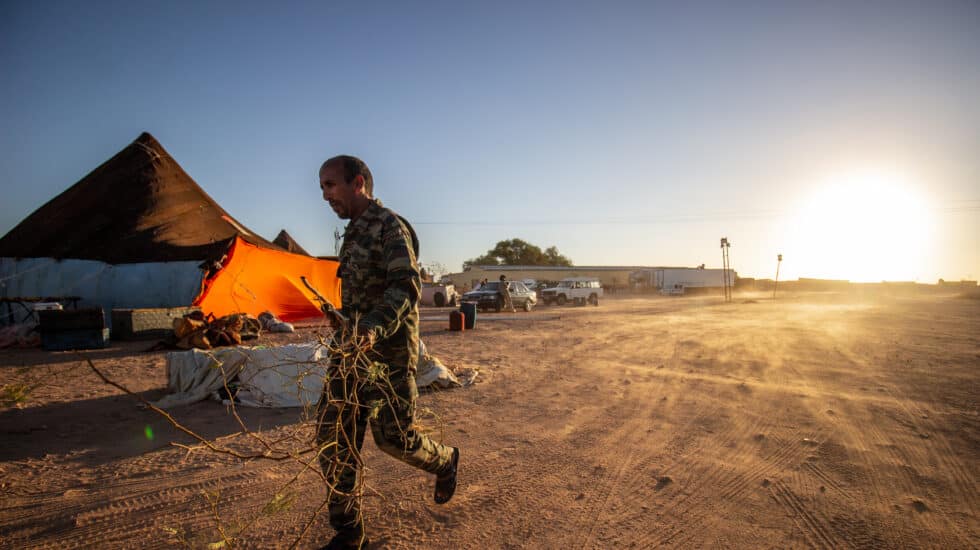

Polisario soldier in the province of Aucerd.
The Court of Justice of the European Union (CJEU) held this Monday the first of two hearings scheduled to decide the validity or invalidity of the trade and fisheries agreement between the EU and Morocco, with reproaches emerging between the defense of the Sahrawi Polisario Front. and the Council and the European Commission.
The first hearings were marked by debate over whether the Polisario Front has the legal legitimacy to represent the interests of the Saharawi people in international bodies after the General Court of the European Union (TGUE) in 2021 upheld two appeals by the Polisario to annul the EU-Morocco agriculture and fisheries agreement .
The TGUE, acting as a public court of first instance, considered that these agreements should have been approved by the Polisario Front, as the representative of the Sahrawi people, since they involve the export of agricultural products and fishery resources obtained in the territories of the Western Region. Sahara and adjacent waters.
European Commission defends deal with Morocco
The European Commission – the EU’s executive arm – and the European Council, which brings together the governments of each EU member state, appealed the TGEU decision to the CJEU, which is the Union’s final court, and condemned the TGEU decision at today’s hearing. a “legal error” which, in their opinion, entails “the subordination of EU external action to the consent of the Polisario Front.”
Spaniard Daniel Calleja acts as a lawyer for the European Commission at the hearing.
According to a European Commission lawyer present at the hearing, Spanish Daniel CallejaThe Polisario Front is “one of the main actors” in resolving the Sahrawi conflict, but “not the only representative” of its people, and stressed that it controls only about 20% of the Sahara and that, in addition, it does not have the administrative structure to implement the agreement on trade and fisheries.
“Morocco controls most of the territory where the agricultural land is located. Morocco is the only country that can guarantee fishing activities and their sustainability (…) The agreements require that there be authorities that can certify the origin of exports,” he added. Calleya, who heads the legal service of the Commission and represents the executive branch of the community in the most important disputes.
According to the lawyer, the suspension of the agreements “will lead to a slowdown in the economic development” of Western Sahara, “dooming this population to a situation of isolation and lethargy.”
In this sense, he stressed that the pact with Morocco will lead to “welfare” for the Sahrawi people in the form of increased employment and improved infrastructure, and will also be a source of income for the payments that the Commission plans to obtain fishing licenses and grants that will allow 128 European vessels to fish fishing in Saharan waters, 93 of which are Spanish.
El Polisario: “The agreement finances the occupation project”
On the other hand, the lawyer of the Polisario Front, Gilles Deversreproached that the collection of these licenses does not compensate Western Sahara, but rather “they pay their oppressor, which is Morocco, to continue to finance their project of illegal and colonial occupation.”
According to Devers, the agreements concluded between Brussels and Rabat are “an affront to international law” because, in his opinion, “they erase the right of the Sahrawi people to self-determination” recognized by the United Nations and violate “respect for their permanent sovereignty and natural resources.”
From refugee camps and Moroccan prisons where Sahrawi activists are imprisoned, an entire city is watching this trial.
“The European Commission’s analysis misses the fact that products from Western Sahara are imported into the EU, since products originating in Morocco are included in the Moroccan tariff quota and counted in Moroccan exports,” said a European Commission lawyer. Polisario Front.
Devers examined the recent history of Western Sahara, a former colony of Spain that was invaded and militarily occupied by Morocco.
“From the refugee camps and from the Moroccan prisons where Sahrawi activists are imprisoned, a whole city is looking at this court,” the lawyer said in an address to the CJEU judges, who will return this Tuesday to preside over a second look.
The Sahrawi delegation was accompanied in the meeting room by a representative of the Polisario Front in Spain: Abdullah Arabias well as MP Sumar of Sahrawi origin Tesh Sidi and MEP for Izquierda Unida Sira Rego.
Spain, which is a party to the proceedings, also intervened in the hearing through a government lawyer. Andrea Havelawho joined the position of the European Commission and stated that “it is not for the EU or its courts” to decide the issue of Western Sahara sovereignty.
“Spain defends the central role of the United Nations in finding a lasting, fair and mutually acceptable solution to the problem of Western Sahara,” Gavela added.
In addition, he said that the Polisario Front does not have the right to “consider itself directly or indirectly affected” by the trade agreement between the EU and Morocco.
In a 1979 resolution, the UN General Assembly called the Polisario Front “the representative of the people of Western Sahara” and recommended that the organization “participate fully in any search” for a solution to the conflict.
The EU is Morocco’s main trading partner. In 2022, 56% of Moroccan exports went to the bloc of communities, and 45% of imports came from the Twenty-Seven countries. For the EU, Morocco is also a key partner on the southern shore of the Mediterranean.
Source: El Independiente